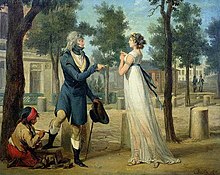
Back احتقار Arabic Menyspreu Catalan Кураймасăр йĕрĕнни CV Verachtung German Malrespekto Esperanto Desprecio Spanish Mespretxu Basque خواری Persian Mépris (émotion) French בוז HE

| Part of a series on |
| Emotions |
|---|
  |

The woman has been interpreted as a prostitute (who is disdaining the inadequate coin proffered by the fashionable gentleman getting his shoes shined at left).
In colloquial usage, contempt usually refers to either the act of despising, or having a general lack of respect for something. This set of emotions generally produces maladaptive behaviour.[1][2] Other authors define contempt as a negative emotion rather than the constellation of mentality and feelings that produce an attitude. Paul Ekman categorises contempt as the seventh basic emotion, along with anger, disgust, fear, happiness, sadness and surprise. Robert C. Solomon places contempt on the same emotional continuum as resentment and anger, and he argues that the differences between the three are that resentment is anger directed towards a higher-status individual; anger is directed towards an equal-status individual; and contempt is anger directed towards a lower-status individual.[3][page needed]
- ^ TenHouten, W.D. (2007), A General Theory of Emotions and Social Life. Routledge.
- ^ "Definition of CONTEMPT". www.merriam-webster.com. 2024-01-20. Retrieved 2024-01-26.
- ^ Solomon R.C. (1993). The Passions: Emotions and the Meaning of Life. Hackett Publishing.